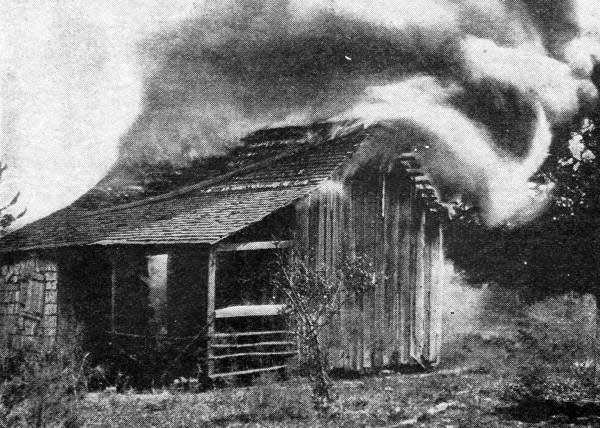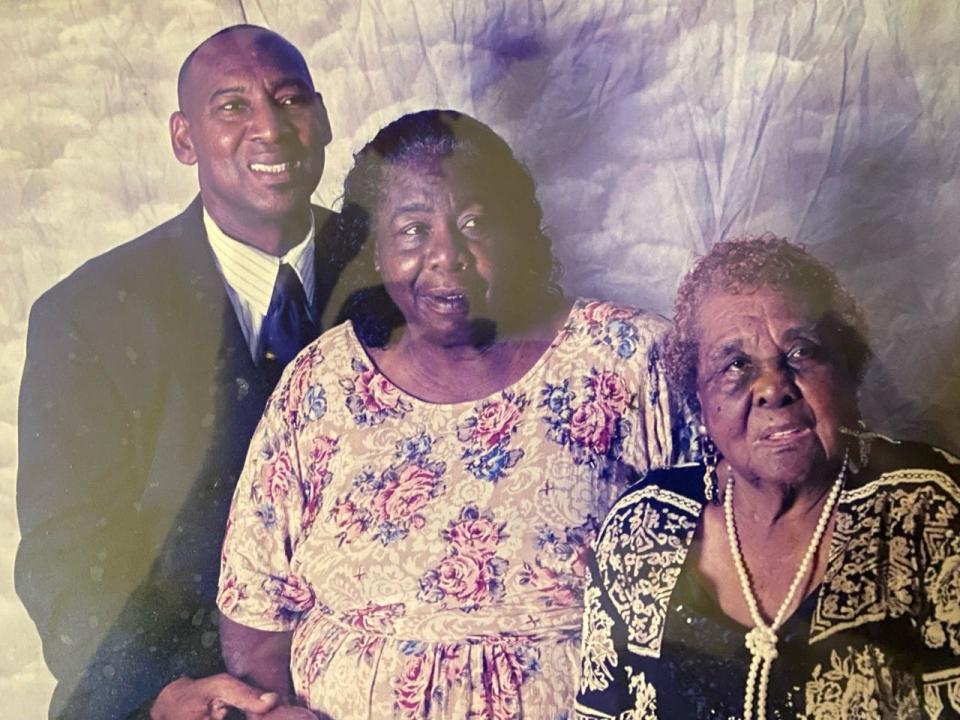100 years after Rosewood Massacre, descendants say their relatives were forever marked
One hundred years ago, Robie Robinson, then 7 or 8 years old, was put on a train with her sister Sebie and slipped out of the only Florida community she had known, a place she'd someday remember for its abundance of flowers.
Rosewood.
Today, Rosewood is a single building and a roadside marker on State Road 24 in Levy County, about 50 miles west of Gainesville. What was once a thriving Black community now exists only in yellowing news articles and in the stories descendants tell of what their ancestors endured, escaped or survived.
That little Robie lived, that her now 66-year-old son, Allen Mortin Sr. of West Palm Beach, lives to share what happened in Rosewood during the first week of January 1923 owes much to chance.
Robie's father, Nathan Robinson, worked at a sawmill in Sumner, not far from Rosewood, and he heard that a white woman had accused a Black man of beating and raping her. Regardless of its veracity, any Black man in the American South knew what such an allegation meant: white rage and violence, the type of murderous fury that swept through a Black community like an inferno, hot and heedless.
Such violence, Black people knew, would not be discreet, and it would not be checked. Indeed, some of its perpetrators were likely to be white men whose job it was to uphold the law.

Knowing all of that, Robinson put his little girls on a train and got them out of town. Other Black residents escaped through swamps. Robinson's actions to evacuate his girls almost came too late. The mayhem had already begun, Robie remembered for a Newsweek magazine reporter in 1995.
Remembering Rosewood:Descendants mark racial violence that razed Florida town 100 years ago
'They killed everybody they ran across'
Robinson bypassed the center of Rosewood as he took his girls to the train depot. "If Papa had took us through there, we would've been dead," Robie told the magazine. She didn't know it at the time, but her uncle, James Carrier, had already been killed by a rampaging mob of white vigilantes.
"They killed everybody they ran across," Robie told Newsweek. "They even made my uncle, James Carrier, dig his own grave with one hand — he'd had a stroke and one side was completely gone — and then they shot him in it."
Angry white men looted the property and livestock of their Black neighbors and burned Rosewood to the ground. The Rosewood road marker says seven people were killed — five Black people and two white people who were killed as they attacked a home. The horror of what would come to be called the Rosewood Massacre was captured in the 1997 movie "Rosewood."
Racial violence marked much of late 19th and early 20th centuries in the United States. All-white juries often refused to convict fellow white people of any crimes associated with that violence — and that's if anyone was ever arrested and charged.
Black lives that were wrecked wouldn't be made whole. Property that was taken wasn't returned. Typically, there would be no reckoning. Black victims of such violence nursed their hurt quietly.
"A lot of people didn't talk about it that much," Mortin said of the Rosewood Massacre, adding that, in the 1970s, when an author showed up to interview his mother, "She didn't really know if she wanted to talk to him or not."
Fear of what had already happened — and of what could happen to any Black person who "stirred up trouble" asking questions about it — kept people silent.
"This story was never told," said Greg Doctor, a retired Army logistics specialist in Atlanta whose grandmother and her siblings survived the massacre. "I didn't learn anything about Rosewood until I was 19 years old."
Doctor said he remembers that the end-of-year holiday season wasn't as festive for his family as it was for others.
"At Christmastime, family would be down," he said. "There'd be pain and tears. I didn't understand it. The elder statesmen of the family, they had vowed to take this to the grave. A lot of them had changed their names, changed from where they were from."
His grandmother, Doctor said, never regained a sense of safety. "For 70 years, my grandmother carried this pain," he said. "She kept a .22 pistol. She slept with it. She carried it at all times."
Robie Robinson settled in Palm Beach County
For Robie, the massacre meant family separation. She wouldn't see some relatives for 70 years. Mortin said he's not sure how his mother made it to Palm Beach County, but she was settled first in Lake Park and then in Riviera Beach, where she would marry and eventually raise her own family.

The nightmare that was Rosewood, however, wouldn't be confined to the shadows. Survivors dragged it out into the light, and, in 1994, got the state of Florida to acknowledge the wrongs done to them and to their community.
The Legislature passed a bill awarding more than $2 million to the survivors. A scholarship fund was set up that has now helped more than 350 Rosewood descendants attend college.
Rosewood is one of the rare instances in American history when some measure of financial redress was made to Black victims of white violence, and it stands in contrast to the experience of survivors of the Tulsa race riot of 1921, when 35 square blocks of one of the most prosperous Black communities in the United States were burned to the ground.
The Tulsa riot, sparked by an allegation that a Black male shoe shiner had assaulted a young white woman who worked as an elevator operator, resulted in 39 deaths, according to a 2001 report, with Black people accounting for 26 of those killed.
Unofficial accounts peg the death toll much higher, somewhere closer to 300. Black survivors have, so far, been unsuccessful in getting compensation from Tulsa or the state of Oklahoma, which they said should have acted to protect them.
West Palm attorney helped Robie claim settlement money
West Palm Beach attorney Richard Ryles, who helped Robie claim her portion of the Rosewood settlement money, said supporters of the fund's establishment were careful not to call it "reparations," lest it lose support from white legislators. So, they called it a compensation fund set up to repay the survivors of Rosewood for some of what had been taken from them.
Ryles' work for Robie, who died in 2010 at age 95, was pro bono. "Mrs. Mortin was a beautiful woman," he said. "Her story pulled on my heartstrings."
Ryles, who has won millions for clients as a personal injury lawyer, said working to get redress for Robie is "probably the greatest achievement that I can point to in terms of my legal career." She shared with him not just her own experiences, Ryles said, but also the experiences of other survivors.
Robie told him her grandmother returned to Rosewood years after the massacre to reclaim the deed to the home she once owned there.
"Her grandmother owned the house they were living in that was burned down," Ryles said. "She said that her grandmother, when she went to the Levy County Courthouse to claim her deed, they walked her out of there at the end of a shotgun."
Descendants of those who survived the massacre said there is still a type of determined forgetting regarding racial violence like Rosewood, fed in Florida by Gov. Ron DeSantis' push against critical race theory. CRT, which explores how race shapes law and culture, is typically taught in graduate school or in law school. But DeSantis and other conservative Republicans have held it up as an omnipresent form of racism designed to demonize white people today for wrongs carried out in the distant past.
Mortin said that, even today, too few people know about Rosewood. "They don't want anybody to talk about it in school to make their kids feel guilty," he said. "Ron DeSantis doesn't want anything like that discussed."
But Rosewood will be discussed — at length — during a series of events organized by Doctor.
In Rosewood on Sunday, Doctor has planned a soil ceremony to honor those who were killed. Artifacts from Rosewood will be on display at the University of Florida in Gainesville, which will also host the viewing of a documentary, a roundtable discussion, a question-and-answer session with a Rosewood descendant and an actress in the movie, and a black-tie awards gala.
Events will be held each day from Sunday through Saturday. Doctor said he has hired security for the Rosewood event, and he said the Levy County Sheriff's Office has promised to have a presence there as well.
Rosewood is still wrestling with racism
In September, the Levy County Sheriff's Office arrested a 61-year-old white man after a Black professor told law enforcement the man screamed racial epithets at him and attempted to run him over with his truck. The professor said he was visiting a property he owns in the Rosewood area.
Mortin, who has visited Rosewood, said he remains wary of the place where his family history was irrevocably altered. As he thinks back on what happened in that small community 100 years ago, as he thinks of what his mother and her family had to endure, anger still flares.
"They were paying taxes," he said. "They should have been protected, but they weren't. The ones that were supposed to protect you were the ones that came out and burned your house down."
More coverage from USA TODAY
Emmett Till: A national park could be key to preserving Emmett Till's memory, legacy, advocates say
School name changes: 82 schools have removed their racist namesakes since 2020. Dozens now honor people of color.
Jackson's water crisis: Mississippi capital's crisis flows from a century of poverty, neglect and racism
'Woke mind virus'? 'Corporate wokeness'? Why red America has declared war on corporate America
Wayne Washington covers West Palm Beach, Riviera Beach and race relations. E-mail tips to wwashington@pbpost.com.
This article originally appeared on USA TODAY: 100 years after Rosewood Massacre survivors' descendants recall pain

